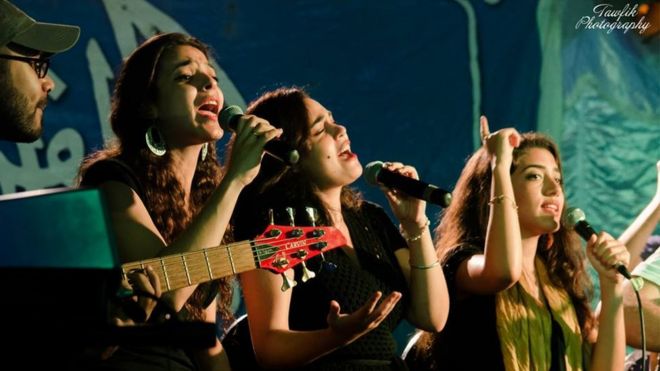
If Egypt's cultural elite had hoped that the overthrow of Islamist President Mohammed Morsi in 2013 would usher in an era of creativity and freedom of expression, they must be deeply disappointed.
Over the past two years, the authorities have jailed writers, closed cultural centres and cancelled events.
Many Egyptian writers, intellectuals, and artists had supported the protest movement against Morsi, which culminated in his removal by the military.
Commentators say convictions on charges such as "indecent dancing" and "contempt of religion" suggest that the government of President Abdel Fattah al-Sisi wants to behave as a guardian of "public morals", in the same way as Morsi and his Islamist supporters did when they were in power.
The BBC asked the culture ministry for a response. The ministry declined to comment on individual cases but said it planned to propose changes to the law "to protect creativity".
Novelist behind bars
In February, the author Ahmed Naji was sentenced to two years in prison for "violating public decency" after "sexually explicit" excerpts from his novel, The Use Of Life, were published in a state-run literary magazine, Akhbar al-Adab.
"The current government, which came after removing its Islamist predecessor, wants to prove through harsh means that it is not against religion or morality," Naji's lawyer, Mahmoud Othman, told the BBC.
Mr Othman, who works with a local group advocating free thought and expression, described the legal term of "indecency" as vague and elastic.
However, Samir Sabry, a lawyer who brought the case against Ahmed Naji, wished the court had "handed him a harsher sentence".
"I challenge those who claim this novel is a creative piece of art to give a copy to their wives or daughters, if they dare... The novel is decadent and contradicts all standards of behaviour," he said.
"If freedom of expression exceeds its limits, it then turns into obscenity and impropriety," Mr Sabry added.
'State of fear'
Fatma Naoot, a prominent secular writer and poet, did not expect to be convicted for a Facebook post in which she expressed an opinion against an Islamic ritual.
In January, Ms Naoot was sentenced to three years in prison for contempt of religion, after she described the Muslim tradition of slaughtering sheep on Eid al-Adha as a "massacre". The sentence was upheld by another court in March.
"There is a contradiction between President Sisi's enlightened vision and what is happening on the ground," Ms Naoot, herself a supporter of the current government, told the BBC.
"The cultural community and writers are in a state of anticipation and fear," she said.
Her conviction was supported by some conservative Muslims.
Fouad Abdel Moneim, a professor of religion and philosophy at Cairo's al-Azhar University, told Al-Ghad Al-Arabi TV: "All of those who attempt to incite sedition in society, particularly in issues related to religion, become subject to the law. What she [Fatma Naoot] did was inappropriate. She even did not apologise for what she said."
The charge of contempt of religion was frequently used by the Egyptian authorities in 2015, making it a "record" year for religion-related trials, according to human rights researcher Ishak Ibrahim.
'Afraid of gatherings'
The measures taken against arts and culture have also included the unexplained closures of cultural centres and banning of artistic events.
In December, "administrative officials" raided the Townhouse, a non-profit art gallery that has been operating in central Cairo for 18 years.
According to Townhouse's manager, Yasser Grab, the officials told his staff that although they had committed "no violation", the centre would still be shut down.
An affiliated theatre, called Rawabet, was also closed.
In 2014, an arts festival known as El-Fann Midan (Art is a Square) was denied a security permit. The event, launched after the uprising that toppled former President Hosni Mubarak in 2011, aimed to bring to the street the arts that were revived by the popular revolt.
"The security bodies are just afraid of all gatherings, even peaceful and entertaining ones," event organiser and poet Zein al-Abidine Fouad said.
Belly-dancing 'debauchery'
In 2015, two Egyptian belly dancers, known as Bardis and Shakira, were sentenced to three months in jail - reduced from an original six months' sentence - for "inciting debauchery" and "broadcasting obscenities".
One grassroots rights group, Daftar Ahwal, reported that there were 59 prosecutions in 2015 for "sexually-arousing dancing" and 10 for "objectionable" literary and art works. The figures could not be independently verified.
This comes in the bigger context of a perceived crackdown on personal freedoms, particularly sexual freedom.
A researcher for the Egyptian Initiative for Personal Rights (EIPR), Dalia Abdel Hamid, described the number of arrests for alleged debauchery as "unprecedented", with at least 200 cases in relation to homosexuals and transsexuals since 2013.



No comments:
Post a Comment